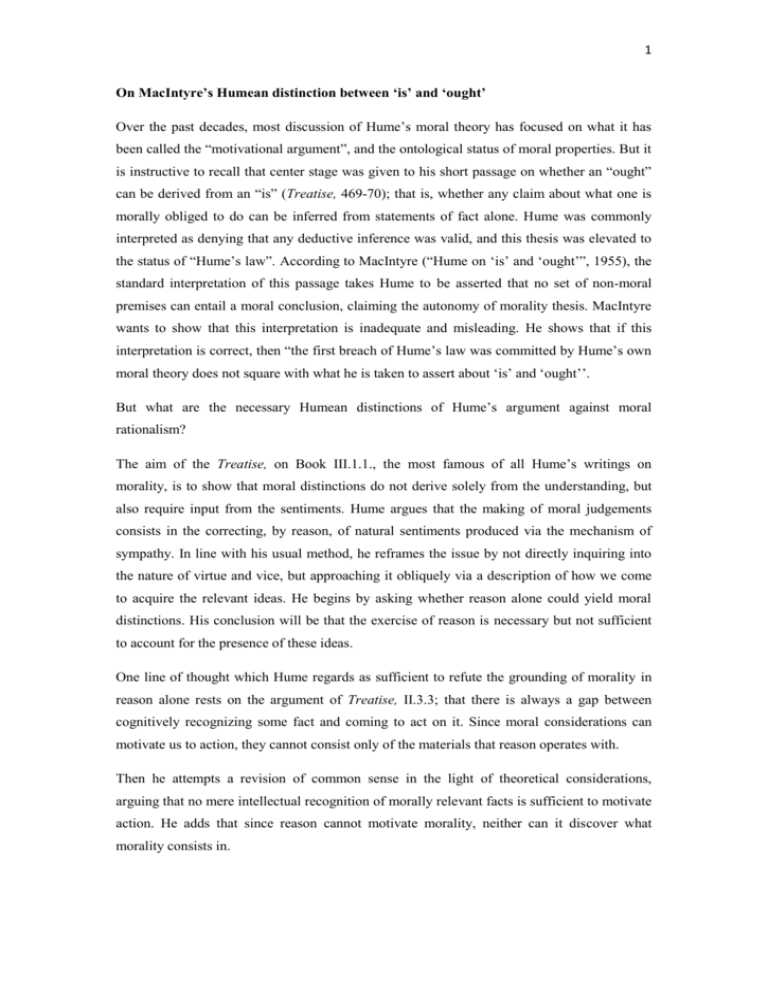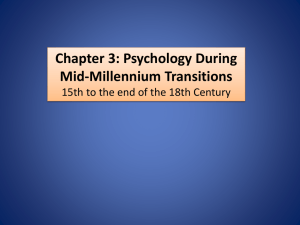Pournari AbstractISME2014
advertisement

1 On MacIntyre’s Humean distinction between ‘is’ and ‘ought’ Over the past decades, most discussion of Hume’s moral theory has focused on what it has been called the “motivational argument”, and the ontological status of moral properties. But it is instructive to recall that center stage was given to his short passage on whether an “ought” can be derived from an “is” (Treatise, 469-70); that is, whether any claim about what one is morally obliged to do can be inferred from statements of fact alone. Hume was commonly interpreted as denying that any deductive inference was valid, and this thesis was elevated to the status of “Hume’s law”. According to MacIntyre (“Hume on ‘is’ and ‘ought’”, 1955), the standard interpretation of this passage takes Hume to be asserted that no set of non-moral premises can entail a moral conclusion, claiming the autonomy of morality thesis. MacIntyre wants to show that this interpretation is inadequate and misleading. He shows that if this interpretation is correct, then “the first breach of Hume’s law was committed by Hume’s own moral theory does not square with what he is taken to assert about ‘is’ and ‘ought’’. But what are the necessary Humean distinctions of Hume’s argument against moral rationalism? The aim of the Treatise, on Book III.1.1., the most famous of all Hume’s writings on morality, is to show that moral distinctions do not derive solely from the understanding, but also require input from the sentiments. Hume argues that the making of moral judgements consists in the correcting, by reason, of natural sentiments produced via the mechanism of sympathy. In line with his usual method, he reframes the issue by not directly inquiring into the nature of virtue and vice, but approaching it obliquely via a description of how we come to acquire the relevant ideas. He begins by asking whether reason alone could yield moral distinctions. His conclusion will be that the exercise of reason is necessary but not sufficient to account for the presence of these ideas. One line of thought which Hume regards as sufficient to refute the grounding of morality in reason alone rests on the argument of Treatise, II.3.3; that there is always a gap between cognitively recognizing some fact and coming to act on it. Since moral considerations can motivate us to action, they cannot consist only of the materials that reason operates with. Then he attempts a revision of common sense in the light of theoretical considerations, arguing that no mere intellectual recognition of morally relevant facts is sufficient to motivate action. He adds that since reason cannot motivate morality, neither can it discover what morality consists in. 2 This argument is of double advantage to our present purpose. For it proves directly, that actions do not derive their merit from a conformity to reason, nor their blame from a contrariety to it; and it proves the same truth more indirectly, by shewing us, that as reason can never immediately prevent or produce any action by contradicting or approving of it, it cannot be the source of the distinction betwixt moral good and evil, which are found to have that influence. Since the work of understanding consists in either the comparison of ideas or in the discovery or inference of empirical facts, then, if reason were capable of discovering moral distinctions, ‘the character of virtuous or vicious either must lie in some relations of objects, or must be a matter of fact, which is discovered by reasoning’. (Treatise, 463) Hume’s intention is not to deny that morality is founded in matters of fact, but only to oppose the claim that it consists in facts that the understanding alone can discover. What kind of facts are these? Certainly not facts that are objective ‘out there’ in the sense of being independent of all possible human perceptual capacities. In conclusion, the source of morals does not reside in the realm of reason, in ideas nor the relations between them. Rather, it is grounded in secondary impression. But nothing so far has denied some role to reason in the discovery of moral distinctions. That is, nothing denies that its involvement is a necessary condition for moral evaluation, only that it is necessary and sufficient for it. On the controversy related to the interpretation of “deduction” MacIntyre points out that the eighteenth-century usage of this term was wider than our own, including not just what Hume would call demonstrative inference but also induction. He argues that the immense respect accorded to Hume thus interpreted is puzzling, since it is radically inconsistent with the disapproval with which contemporary logicians are apt to view certain of Hume’s arguments about induction. Related to the interpretation of ‘deduction’, including not just what Hume would call demonstrative inference but also induction, it is essential to keep the precise location of Hume’s remarks in mind. They occur at the end of a chapter devoted to a sustained critique of moral rationalism. In fact, the passage itself ends with an explicit reference to such theories, and his view that ‘the objects, nor is perceived by reason’. It is therefore reasonable to assume that such theories are the target of this passage, and with the usual interpretation of Hume as saying that within the rules of deductive reasoning, no moral judgement can be logically derived from any set of factual statements. Having already refuted rationalism by a series of arguments, most importantly the argument from motivation, then, he is saying that while we actually do move from factual to moral judgements, we utilize our motivationally active passions as well as our reasoning capacities. 3 He then turns to the task of specifying the nature of these impressions, and the causal mechanisms leading to their production. (Treatise, 471) Then, he adds that the determination of virtue is not, ultimately, the work of reason, in that we ‘do not infer a character to be virtuous, because it pleases: But in feeling that it pleases after such a particular manner, we in effect feel that it is virtuous’. (Treatise, 471) Hume is not a naïve subjectivist, since does not deny that reason plays an essential, if ultimately subsidiary, role in moral judgement. A moral judgement is the culmination of a complex process in which reason refines and corrects our initial indirect passions. His point is that in making a moral judgement, one assumes a certain stance in which these refined passions are felt, and there is no extra move of rational inference, of ‘I have a feeling of moral approval towards this person, therefore he has a virtuous character’. The specific conditions under which moral evaluations can be made are first, involved persons, either oneself or others. In particular, there requires the ‘double relation of impressions and ideas’, that marked the presence of indirect passions. In sum, the presence of an indirect passion is necessary condition of making a moral judgement, or equivalently, having a moral sentiment. But these should not be considered as a species of indirect passions, (1) their object is always a character trait considered as such, rather than a peculiar person, and (2) a passion only becomes essentially moral when it emerges from the ‘general point of view’. Having gone some way to distinguish the moral sentiments from other passions, the next question that arises is to determine the particular kinds of character traits that cause moral approval or disapproval. With his general discussion of the passions, Hume remarks that it would be absurd to say that ‘in every particular instance, these sentiments are produc’d by an original quality and primary constitution” (Treatise, 473). That is, it would be just as absurd to say that nature has given us a separate affective response for the disapproval of lying, of theft, of cruelty and so on, as it would to ascribe a separate physical principle for the falling of leaves, or apples, or books. The scientific enterprise is to find common principles underlying these particulars. So the aim is to ‘find some pore general principles, upon which all our notions of morals are founded’. (Treatise, III.3)







